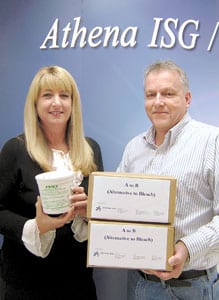Athena GTX markets alternative ‘superbug’ killer

.floatimg-left-hort { float:left; } .floatimg-left-caption-hort { float:left; margin-bottom:10px; width:300px; margin-right:10px; clear:left;} .floatimg-left-vert { float:left; margin-top:10px; margin-right:15px; width:200px;} .floatimg-left-caption-vert { float:left; margin-right:10px; margin-bottom:10px; font-size: 12px; width:200px;} .floatimg-right-hort { float:right; margin-top:10px; margin-left:10px; margin-bottom:10px; width: 300px;} .floatimg-right-caption-hort { float:left; margin-right:10px; margin-bottom:10px; width: 300px; font-size: 12px; } .floatimg-right-vert { float:right; margin-top:10px; margin-left:10px; margin-bottom:10px; width: 200px;} .floatimg-right-caption-vert { float:left; margin-right:10px; margin-bottom:10px; width: 200px; font-size: 12px; } .floatimgright-sidebar { float:right; margin-top:10px; margin-left:10px; margin-bottom:10px; width: 200px; border-top-style: double; border-top-color: black; border-bottom-style: double; border-bottom-color: black;} .floatimgright-sidebar p { line-height: 115%; text-indent: 10px; } .floatimgright-sidebar h4 { font-variant:small-caps; } .pullquote { float:right; margin-top:10px; margin-left:10px; margin-bottom:10px; width: 150px; background: url(http://www.dmbusinessdaily.com/DAILY/editorial/extras/closequote.gif) no-repeat bottom right !important ; line-height: 150%; font-size: 125%; border-top: 1px solid; border-bottom: 1px solid;} .floatvidleft { float:left; margin-bottom:10px; width:325px; margin-right:10px; clear:left;} .floatvidright { float:right; margin-bottom:10px; width:325px; margin-right:10px; clear:left;}
A disinfecting agent developed for the U.S. Army more than 45 years ago could provide health-care providers with a new tool to help combat deadly antibiotic-resistant germs.
Athena GTX, a Des Moines-based manufacturer of biomedical monitoring equipment, has tested and begun selling the product, which it says is 10 times more effective than ordinary bleach in killing some of the fastest-growing “superbugs,” including methicillin-resistant Staphylococcus aureus, or MRSA.
“This is really cool stuff,” said Mark Darrah, president of Athena. Darrah, who moved his medical monitoring device company to Des Moines from California a year ago, said he thinks the formulation, known as Tri-chloromelamine, could help address a growing national problem.
“It’s a phenomenal biocidal agent,” said Darrah, who learned about it from talking with the owner of the company that manufactures it, whom he met on a Southwest Airlines flight earlier this year.
“We got to talking about what we each do, and he said, ‘I have something that might be of interest to your firefighters and your hazmat guys.’ One thing led to another and we started doing this testing.”
Athena, whose primary products include a wireless medical monitoring device for the military, was recently awarded a statewide contract with the state of Texas to test that vital signs monitor with LifeFlight and emergency medical services teams.
The company has been awarded $4 million in Department of Defense funding, but its expansion plans have been delayed because it has yet to receive any of that money, Darrah said.
“We’ve been waiting for over a year,” Darrah said. “We understand it takes some time, but we’re getting pretty frustrated with our contractor. They say they’re overworked and understaffed.”
Athena also manufactures MiniMedic, a small sensor that sticks onto the forehead designed to send vital signs from injured soldiers on the battlefield to an aid station, as well as hazardous-material response clothing.
Once the military funding begins coming in, “we could probably (hire) five more engineers; then we’re looking at about five to 10 manufacturing people as we get rolling,” Darrah said. “The job growth is always dependent on cash flow. We’ve funded pretty much all of this on our own nickel.”
The product, a powder that is dissolved in water, was tested at a University of Wisconsin laboratory and shown to have a 99.999 percent kill rate on MRSA. Athena is now having the product, which it calls Alternative to Bleach, or A-to-B, tested to determine its effectiveness against Clostridium difficile, also known as C-diff, a once-benign bug that has adapted deadly strains due to overuse of antibiotics.
Darrah said hospitals and other care facilities typically use bleach-based products that could be replaced with Athena’s product, which also kills mold and other less toxic strains of bacteria. It’s also friendlier to people and the environment, he said. Though people react negatively when they see the word “melamine,” which was linked to a tainted milk scandal in China, the substance has the same toxicity as table salt, he said.
Darrah said he has gotten little response from hospitals he has contacted in Iowa about the product, though there has been some interest from the Iowa High School Athletic Association
for use by wrestling teams, he said. Sandy Peno, a nurse epidemiologist with Iowa Health – Des Moines, said Iowa Health’s hospitals aren’t familiar with the product.
“That’s not to say that we wouldn’t take a look at it,” she said. “We’re always evaluating products. There is a specific team that evaluates products on the market on an ongoing basis. We just haven’t seen this.”
Peno said Iowa Health’s hospitals “most definitely” see cases of both C-diff and MRSA.
“You can get MRSA in the hospital, but you can also get that and C-diff out in the community, particularly from antibiotic overusage,” she said. “So we’re seeing cases coming from the community.”
In addition to routine procedures used to keep the hospital environment clean, Iowa Health encourages hand washing and has waterless disinfectant hand-gel dispensers located throughout its facilities for patients, doctors, visitors and the public to use, Peno said.








